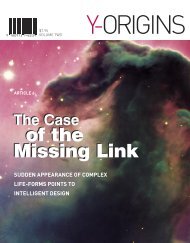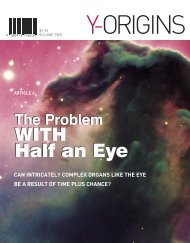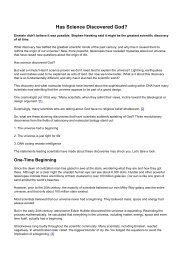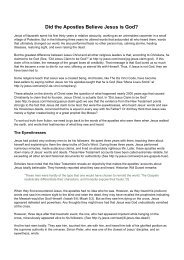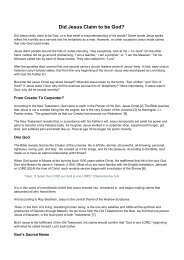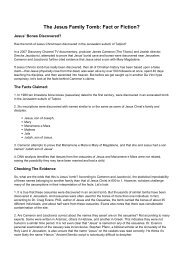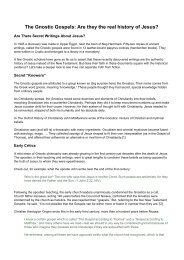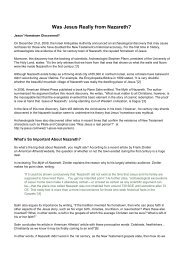1880
Create successful ePaper yourself
Turn your PDF publications into a flip-book with our unique Google optimized e-Paper software.
Tragically, Jesus’ words came true. One million Jews were killed forty years later as Titus and the Roman army<br />
destroyed Jerusalem. The Jewish historian, Josephus, recorded these unusual signs during Jerusalem’s fall in 70<br />
A.D.[18]<br />
1. “A meteor, resembling a sword, hung over Jerusalem one whole year.”<br />
2. “A light equal to the brightness of the day, continued for half an hour.”<br />
3. “Chariots and armed men were seen in the air”<br />
Josephus writes of other unusual things that occurred during the Roman siege as well. What did these signs<br />
mean? Some scholars believe Jesus’ return in the clouds was fulfilled figuratively by these signs in 70 A.D.[19]<br />
However, the actual fulfillment of Jesus’ literal return to Jerusalem has not yet occurred.<br />
Was Jesus Right about His Resurrection?<br />
The third significant prediction Jesus made was that he would rise from the dead after being crucified. Of that<br />
claim, Bible scholar Wilbur Smith argues:<br />
When he said that He himself would rise again from the dead, the third day after He was crucified, He said<br />
something that only a fool would dare say, if He expected longer the devotion of any disciples—unless He<br />
was sure He was going to rise. No founder of any world religion known to men ever dared say a thing like<br />
that.[20]<br />
Jesus’ prediction put everything else he said in jeopardy. If he didn’t rise from the dead as promised, why would<br />
anyone continue believing him? Yet his followers enthusiastically did. In a New York Times article, Peter Steinfels<br />
cites the startling events that occurred three days after Jesus’ death:<br />
Shortly after Jesus was executed, his followers were suddenly galvanized from a baffled and cowering<br />
group into people whose message about a living Jesus and a coming kingdom, preached at the risk of<br />
their lives, eventually changed an empire. Something happened. … But exactly what?[21]<br />
So, what did happen that turned the first century world on its heels? Is there evidence that Jesus did rise from the<br />
dead? Skeptic Frank Morrison originally began writing a book to disprove the resurrection. After examining the<br />
evidence, he reversed himself and wrote a different book on why he believed it to be true.<br />
Another skeptic, Dr. Simon Greenleaf, founder of Harvard Law School, scoffed at Jesus’ resurrection to some law<br />
students. When challenged to investigate, Greenleaf began applying his famous rules of evidence to the case.<br />
After a detailed evaluation of the evidence, he became convinced that the resurrection really happened, primarily<br />
because of the radical change in the disciples (see “Did Jesus rise from the dead?” )<br />
So, if Jesus fulfilled numerous messianic prophecies written hundreds of years before his birth, correctly predicted<br />
the fall of Jerusalem, and kept his incredible promise to rise from the dead as the evidence suggests, would any<br />
reasonable person doubt his promise to return?<br />
Where Will Jesus Return?<br />
The Bible speaks of the Lord returning to the Mount of Olives in Jerusalem.[22] Some may ask, “Why not in New<br />
York, London, Los Angeles or Tokyo?” But God chose Jerusalem as the place of his return. Although Jerusalem<br />
is tiny among such cities, it is of the utmost importance to God. A brief history explains why.<br />
Jerusalem was the place (originally called Moriah) where God told Abraham to sacrifice his only son, Isaac. But<br />
God stopped Abraham from sacrificing Isaac, instead providing a ram for him to offer. In fact, God had never<br />
intended Isaac to be sacrificed; he was testing Abraham’s faith, and giving us a symbolic picture of his only Son<br />
being sacrificed 2,000 years later in Jerusalem, near that very spot.





